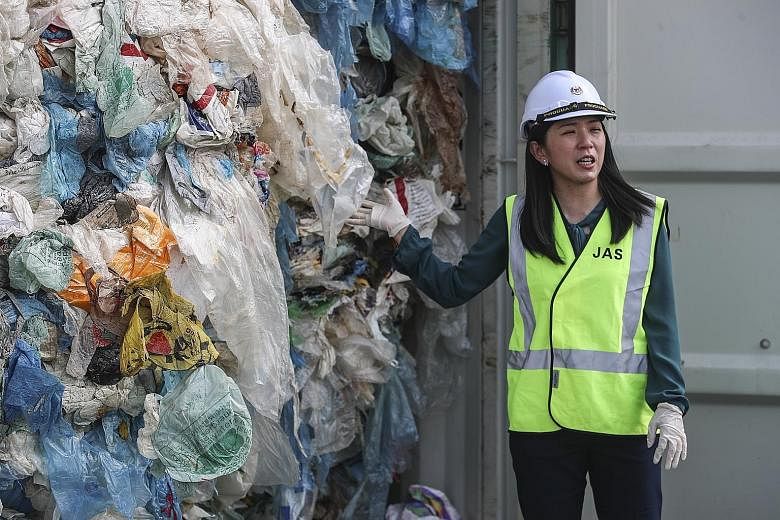Malaysia is cracking down on plastic waste by going after the wallets of those who illegally import the polluting garbage and imposing higher penalties on importers, Environment Minister Yeo Bee Yin has said, two days after labelling these importers "traitors".
Ms Yeo threatened to open, at the ports, each and every container suspected of containing plastic rubbish, and to bill importers for the millions of dollars it would cost to ship it back.
And to curb single-use plastic items, she said in a television interview on Thursday, the government has stopped using them at its functions.
"Now at the port, you wait, if you have so many containers, I will keep them there," she said in an interview with private channel 8TV.
"If you want to retrieve it and bring it out, I will open each of them," she added. "Opening one will be RM1,500 (S$490). If you illegally brought it in, you have to ship it back. The entire process costs a few million ringgit."
This would teach the illegal importers a lesson, she said, because the costs of shipping the trash back are "high".
Ms Yeo said the government has identified these importers and is monitoring their moves.
She noted that this was a relatively new phenomenon as plastic waste was not shipped into Malaysia in the past.
She revealed that importers who illegally bring in contaminated plastic waste are exploiting a loophole in the Customs Department's scanners.
She said she had earlier wondered why such waste was still entering the country despite the government's ban from last year.
"So we went to the ports to investigate; some people knew the scanner can't detect (everything), so they used the loophole."
Ms Yeo said the government discovered in April that many importers of illegal plastic waste were making "false declarations" to Customs, knowing that port scanners could detect only plastic items inside a container, but not whether these were plastic waste.
Officials say the modus operandi of many illegal operators is to fill the front of the container with recyclable material while illegal waste is hidden at the back.
Ms Yeo wants to slap on additional fees for opening each container for inspection. The importers will also have to bear the storage cost for the containers at the ports.
"You can't immediately send it back, you have to store it at the port, it costs money every day, this is how we will tackle these traitors."
On Tuesday, Ms Yeo said a total of 3,000 tonnes of plastic waste from some 50 containers were expected to be shipped back to their countries of origin.
Ms Aurora Tin, founder of Zero Waste Movement Malaysia, said: "This is a strong message to Western countries that small countries like us have zero tolerance for illegal dumping and thus they should start building their waste management systems."
The Malaysian government, meanwhile, has started cracking down on single-use plastics, such as bottled mineral water and plastic wrap or cling film, at all government events, from April.
Malaysia has developed a road map for zero single-use plastics, which aims to see the end of the use of plastic drinking straws and carrier bags by 2030.

